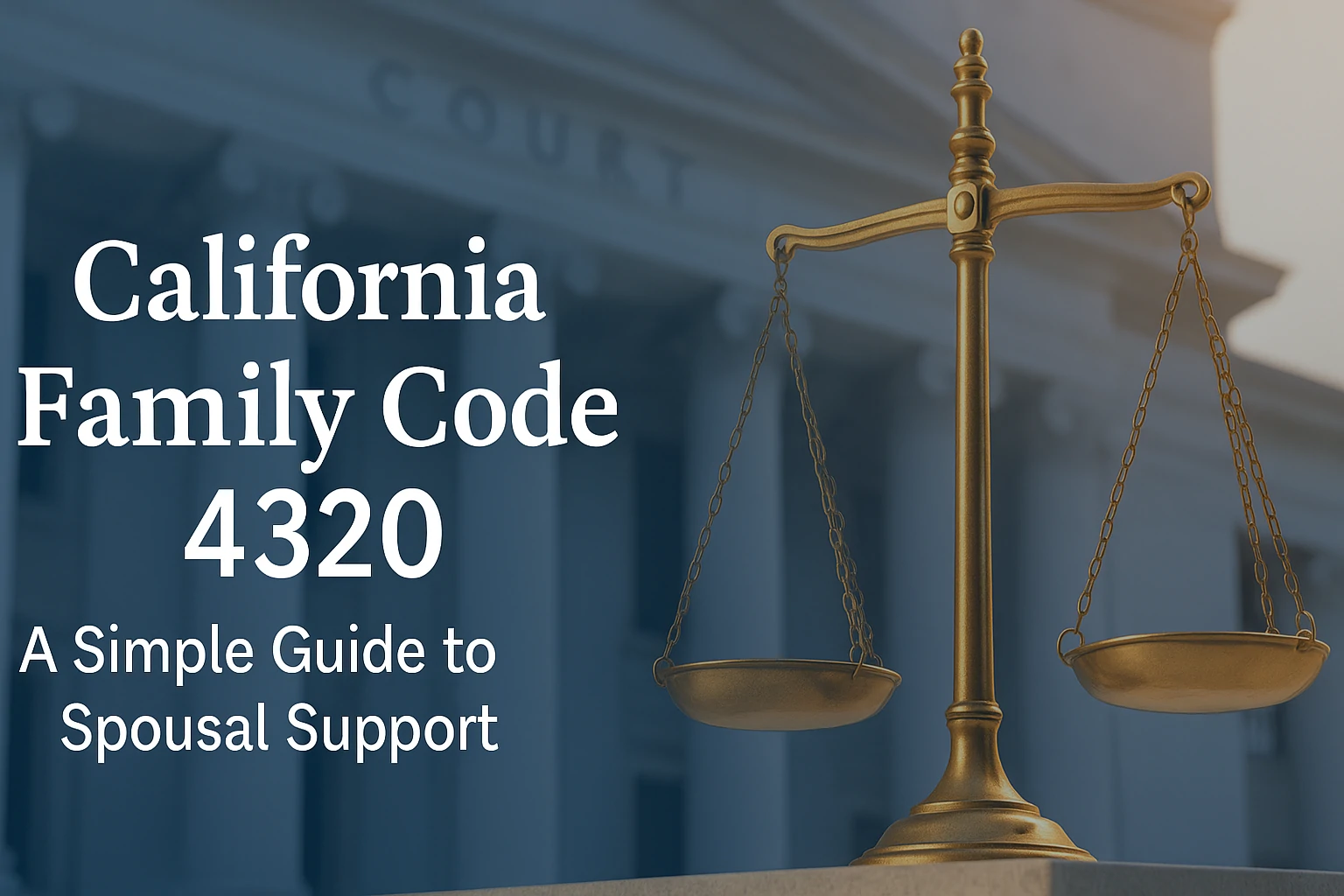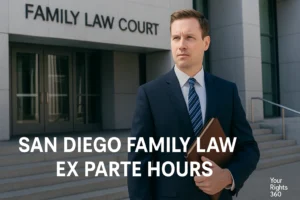Divorce can feel like the end of the world. Emotions run high. Lives change fast. Money becomes a major concern. Many people do not know what comes next or how they will support themselves after the split. California law gives some answers through Family Law Code 4320.
This law plays a big role in spousal support. It helps courts decide who pays, how much, and for how long. It does not leave those decisions to chance. It gives a full list of factors a judge must consider before setting support. Each factor matters.
Spousal support does not follow one fixed formula. Judges use this code to look at both people’s situations. They check income, health, work skills, and other life details. This makes sure that support feels fair on both sides. Whether you may receive or pay support, you need to understand how this law works. It can protect your rights and help you plan your next steps.
What Family Code 4320 Covers
California Family Code 4320 explains how courts must decide spousal support. It applies to both legal separation and divorce. Judges use it to review the life you lived with your spouse and what each of you faces after the split.
This law does not give one answer for everyone. It offers a guide. The court uses this guide to make a support order that fits your unique case. This includes how long you were married, how much each of you earns, and how each of you lived during the marriage.
Family Code 4320 also protects fairness. It aims to avoid one person walking away with all the money or power. It helps create balance, especially when one spouse gave up work to care for the home or support the other’s career.
How Judges Use Family Code 4320
A judge does not guess when setting spousal support. The judge must go through each part of Family Code 4320 and apply it to the case. That means checking job history, education level, property, age, and much more. The court also thinks about the future—not just the past.
One spouse may have built a strong career. The other may have stayed home with the kids or worked a low-income job. The court weighs these things before deciding on support. Each factor adds to the full picture.
The judge will not just look at numbers. The court will try to understand your story. It asks what you gave up during the marriage. It looks at how much time you need to become stable. It also considers any harm or abuse that happened.
Courts also consider parenting roles and gender fairness, especially in matters tied to fathers’ rights in family law and equal support duties.
Marriage Length and Lifestyle
One big part of this law is the length of the marriage. If you were married for less than 10 years, support may last only a few years. If you were married longer, support could go on much longer.
The court also reviews the lifestyle you shared as a couple. That includes where you lived, how much you spent, and what kind of life you built together. The judge tries to keep the supported spouse close to that lifestyle, if possible.
Still, both people may need to adjust. Divorce often leads to less income for both sides. The court balances what is fair with what is possible.
Income and Earning Ability
The court checks how much each person earns now and how much they can earn in the future. If one spouse has no job but can work, the court may give them time to train or study. If one person already makes good money, that may affect how much support they pay.
Judges often ask questions like:
- Can this person go back to school?
- Does this person need child care to work?
- Is it fair to expect this person to work full-time?
If you gave up your career to help your spouse grow theirs, the court will factor that in. Your effort has value. You may need help to get back on your feet, and the law supports that.
Health, Age, and Future Plans
Health and age can also affect spousal support. If one person is older or has a medical condition, they may not be able to work. If someone is young and healthy, they may be expected to return to work in time.
The judge will ask about both spouses’ health. If health issues block someone from earning income, support may last longer. If both people can work, the judge may expect both to try.
The court also wants people to become self-supporting. That means support is not always forever. It may reduce over time or end once the supported spouse finds a stable job.
Sacrifice and Support in the Marriage
If one person helped the other go to college, build a business, or grow a career, the court pays attention. These sacrifices matter. The court sees it as teamwork during the marriage. After divorce, that effort should not go unseen.
You may not have earned income, but you still supported the family. Maybe you stayed home to raise children. Maybe you worked low-paying jobs so your spouse could study or travel for work. These efforts are not small. The law gives value to this time and labor.
Property and Debts
Judges also check what each person owns and what they owe. If one spouse walks away with a home and cars, and the other gets little, spousal support may help balance things. If one person has heavy debts, that may limit their ability to pay support.
The court also checks shared debts. Credit cards, loans, or unpaid taxes can affect the final support order. The judge tries to avoid giving one person all the bills while the other gets all the assets.
Abuse and Crime
Family Code 4320 says abuse must be taken seriously. If one spouse hurt the other, that matters. Courts will not reward abuse. They may deny support to an abusive spouse. They may also raise support for the victim, especially if harm affected their health or job life.
Convictions, restraining orders, and police reports all count. Even if the abuse was never reported, the court can listen to testimony. The goal is to protect the victim and send a clear message against violence.
Tax Effects and Fairness
Tax rules also play a role. Support payments used to be taxed. That changed after 2018 for new orders. Now, spousal support is not taxed to the person receiving it. It is also not deducted from the payer’s income.
The court may adjust amounts to make things more balanced after tax. Judges want to keep things fair in real life, not just on paper.
The law also allows the court to use common sense. If a case has special facts, the judge may weigh those too. The law gives room for human judgment.
Can Support Orders Change?
Yes. Support is not always final. Life changes, and the court knows that. If someone loses their job or gets sick, they can ask the court to change the order. If someone starts earning more money, that can also lead to a new support amount.
The key is to ask the court first. Do not stop paying without a court order. That could lead to legal trouble, interest, or wage garnishment. Always follow the legal steps.
Steps You Should Take
Start with paperwork. Gather tax records, pay stubs, and bills. Show the court your budget and explain your needs. If you ask for support, show why you need it. If you are asked to pay, show what you can truly afford.
Be clear. Be honest. You do not need fancy words. Just show your truth. Courts do not expect perfection. They expect effort.
You may also need to show job search records or proof of school plans. Courts like to see that you are working toward a stable future.
Common Questions
Q. How does the court decide how long support lasts?
The court looks at the length of the marriage. Longer marriages may lead to longer support. Shorter ones may lead to support that ends after a few years.
Q. Can a healthy person still get spousal support?
The court may allow support if that person gave up work or helped build the other spouse’s career. Each case depends on the facts.
Q. What happens if the person paying support loses their job?
They can return to court and ask for a change. They must prove the change in income.
Q. Does the judge look at both people’s debts?
The court reviews both assets and debts. It tries to keep things balanced.
Q. What if the spouse asking for support has a new partner?
Support may end or go down if that person lives with someone else. Courts check cohabitation facts.
Conclusion
California Family Code 4320 gives structure to spousal support. It keeps things fair. It gives courts a full list of facts to look at before making a support order. This law protects people who gave up careers or income for the marriage. It also protects those who may now carry the financial burden.
Spousal support is not about revenge. It is about balance. It helps people stand on their own after the marriage ends. Whether you expect to receive or pay support, this law can help you understand what comes next.
Read it. Learn it. Use it to prepare. A clear path gives you strength during hard times.
Disclaimer: This article is for general information only. It does not give legal advice. Laws may change, and every case is different. Speak with a licensed family law attorney in your area for help with your situation.




